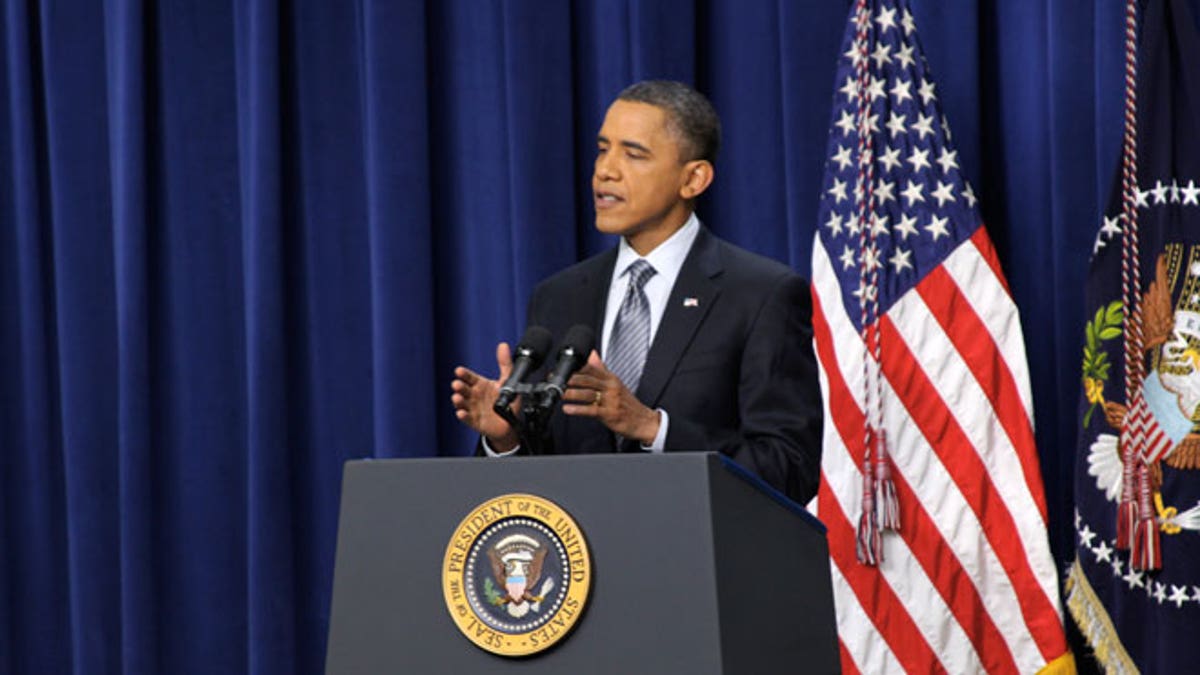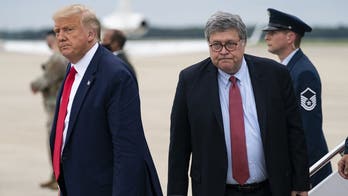
Tuesday: President Obama speaks during a news conference at the Eisenhower Executive Office Building. (FOX News)
Three weeks to the day after his top diplomat described the Mubarak regime as "stable" and responsive to the Egyptian people, President Obama defended the conduct of his national security team during the revolution that rocked the Middle East.
"I think history will end up recording that at every juncture in the situation in Egypt, that we were on the right side of history," Obama said Tuesday when asked during a midday news conference whether he and his aides were "too cautious" and "a step behind the protesters" in Cairo's Tahrir Square. The square served as epicenter of the 18-day uprising that forced longtime Egyptian President Hosni Mubarak to transfer power to a military council ahead of planned elections.
"What we didn't do was pretend that we could dictate the outcome in Egypt, because we can't," Obama said.
The president contended that he and his aides were consistent throughout the crisis in urging all sides to refrain from violence and in articulating American support for universal rights of speech, assembly, and dissent.
And he cited as "positive" the latest developments out of Cairo: "The military council that is in charge has reaffirmed its treaties with countries like Israel and international treaties. It has met with the opposition, and the opposition has felt that it is serious about moving toward fair and free elections."
With scattered protests in Iran stretching into a second day, and the regime there intensifying its use of force and censorship to blunt the threat to its authoritarian rule, the president also rejected charges that he failed to "speak out strongly enough" during the Iranian uprising of June 2009.
"We were clear then and we are clear now," Obama said, adding that the Iranian government's response to the protests has been "to shoot people and beat people and arrest people."
"I find it ironic that you've got the Iranian regime pretending to celebrate what happened in Egypt, when in fact they have acted in direct contrast to what happened in Egypt by gunning down and beating people who were trying to express themselves peacefully in Iran," the president told reporters.
"America cannot ultimately dictate what happens inside of Iran any more than it could inside of Egypt," he added. "Ultimately, these are sovereign countries that are going to have to make their own decisions. What we can do is lend moral support to those who are seeking a better life for themselves."
Critics have argued that the White House and State Department can do more beyond lending moral support.
"The U.S. has a long history of encouraging people to go out in the streets and not supporting them materially, and it can lead to some unnecessary bloodshed. If we were really providing assistance, even covertly, to the Iranian opposition, I would feel a lot better," said former U.S. ambassador to the United Nations John Bolton, during an appearance Monday on the Fox News program "America's Newsroom."
"I don't think we've done enough over the past 10 years to assist the anti-regime forces," Bolton replied.
Secretary of State Clinton -- who on January 25 had characterized the Mubarak regime as "stable," and said it was "looking for ways to respond to the legitimate needs and interests of the Egyptian people" -- told an audience at George Washington University on Tuesday about new plans by the administration to bolster dissident groups tyrannized by repressive regimes.
Clinton announced the administration will spend $25 million this year to shield bloggers and protesters from efforts by countries like China, Iran, Syria, and Cuba to restrict access to the Internet and social networking sites.
"There is a debate underway in some circles about whether the Internet is a force for liberation or repression," Clinton said. "But as the events in Iran, Egypt and elsewhere have shown, that debate is largely beside the point. The Internet isn't good or bad. It is both. It is neither. What matters is what people who go online do there, and what principles should guide us as we come together in cyberspace. That question becomes more urgent every day."




